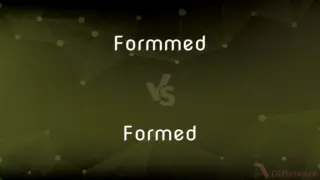Refering vs. Referring — Which is Correct Spelling?
By Tayyaba Rehman — Updated on March 18, 2024
The incorrect spelling is "Refering," while the correct spelling is "Referring." Referring means directing attention or reference to something or someone.

Table of Contents
Which is correct: Refering or Referring
How to spell Referring?

Refering
Incorrect Spelling

Referring
Correct Spelling
ADVERTISEMENT
Key Differences
Remember that words ending in "fer" often double the consonant, like "prefer" becomes "preferring."
Think of "referral," which also has two 'r's, to remember "referring."
Two 'r's could signify double-checking a reference.
The word "refer" gets one 'r' added when it becomes "referring."
"Re-ferr-ing" contains "ferr," like "ferry," which carries things (like attention) from one place to another.
ADVERTISEMENT
How Do You Spell Referring Correctly?
Incorrect: He keeps refering to his notes during the lecture.
Correct: He keeps referring to his notes during the lecture.
Incorrect: She didn't understand what I was refering to.
Correct: She didn't understand what I was referring to.
Incorrect: I was refering to the article you sent me yesterday.
Correct: I was referring to the article you sent me yesterday.
Incorrect: When refering to the manual, always check the index first.
Correct: When referring to the manual, always check the index first.
Incorrect: Are you refering to the incident last week?
Correct: Are you referring to the incident last week?
Referring Definitions
Referring involves directing someone's attention to a different source.
He was referring to the manual for instructions.
Referring can also mean to mention or allude to something.
She was referring to the incident last week.
In a medical context, referring is directing a patient to a specialist.
The doctor is referring her to a cardiologist.
In programming, referring may involve linking to a specific piece of code or data.
The function was referring to a null variable.
Referring can signify citing a text or authority.
He was referring to the Constitution in his speech.
To direct to a source for help or information
Referred her to a heart specialist.
Referred me to his last employer for a recommendation.
To submit (a matter in dispute) to an authority for arbitration, decision, or examination.
To direct the attention of
I refer you to the training manual.
To assign or attribute to; regard as originated by.
To assign to or regard as belonging within a particular kind or class
Referred the newly discovered partita to the 1600s.
To relate or pertain; concern
Questions referring to yesterday's lecture.
To serve as a descriptor or have as a denotation
The word chair refers to a piece of furniture.
To speak or write about something briefly or incidentally; make reference
Referred during our conversation to several books he was reading.
To turn one's attention, as in seeking information
Refer to a dictionary.
Present participle of refer
The act by which somebody or something is referred; a reference.
Referring Meaning in a Sentence
When referring to a book, it's helpful to mention the author and title.
I'm not sure what you're referring to; could you clarify?
He's referring to the time we went hiking and got caught in the rain.
In his speech, he kept referring to historical events to make his point.
When referring to the diagram, please note the labeled parts.
Are you referring to the email that went out this morning?
The teacher was referring to the homework assignment in her email.
When referring to the law, it's important to be precise.
She was referring to the new policy when she mentioned changes.
She was referring to the budget report during the meeting.
I believe you're referring to the meeting scheduled for next Monday.
In literature, authors often enjoy referring to other works.
When you're referring to an article, it's crucial to mention the publication date.
She keeps referring to notes she took during the lecture.
I think you're referring to the wrong document.
Are you referring to the older model or the one just released?
He was referring to the guidelines published by the health department.
While referring to the map, we realized we had taken a wrong turn.
Are you referring to the chapter about ecosystems in the textbook?
The manual keeps referring to a section that doesn't seem to exist.
When referring to a painting, it helps to know the artist's name.
The study he's referring to was published in a reputable journal.
When referring to someone's work, always give proper credit.
He was referring to a study that found significant results.
I'm referring to the project we discussed last week, not the one from yesterday.
Referring Idioms & Phrases
Referring to the drawing board
Planning anew after a plan or idea fails.
The project didn't work out, so it's time we start referring to the drawing board.
Referring back to square one
Going back to the beginning after a failed attempt or misunderstanding.
After realizing the error, we were referring back to square one.
Referring to the heart of the matter
Getting to the central or most important issue.
Let's stop beating around the bush and start referring to the heart of the matter.
Referring to the elephant in the room
Addressing a large, obvious problem that everyone is ignoring.
It's time we start referring to the elephant in the room and deal with our financial issues.
Referring to the tip of the iceberg
Indicating that there is a much larger problem or issue than what is initially seen.
The minor errors in the report are just referring to the tip of the iceberg of our problems.
Referring over one's head
Discussing or explaining something in a way that is too complex for someone to understand.
The technical details he's referring to are completely over my head.
Referring to the old drawing board
Similar to "referring to the drawing board," it means to start over.
That idea didn't pan out, so we're referring to the old drawing board.
Referring to thin air
Discussing something that doesn't have a basis in reality.
His theories are like referring to thin air; there's no evidence.
Referring by the book
Following rules or guidelines strictly.
When it comes to safety, we're referring by the book.
Referring under the rug
Attempting to hide or ignore problems or mistakes.
We can't keep referring mistakes under the rug; they need to be addressed.
Referring to a dead horse
Wasting time and effort on something that already failed or is past the point of return.
Arguing about this now is like referring to a dead horse.
Referring across the aisle
Trying to work or cooperate with the opposition or competitors.
For this initiative to succeed, we need to start referring across the aisle.
Referring around the bush
Avoiding the main topic or issue, not speaking directly.
Let's not keep referring around the bush and get to the point.
Referring to all and sundry
Making information known to everyone or discussing it openly.
He's been referring to his plans to all and sundry, so everyone knows.
Referring to open doors
Discussing opportunities or possibilities.
By getting this certification, you're referring to open doors for your career.
Referring to the grindstone
Getting back to hard work or focusing on the task at hand.
After the break, it's time to start referring to the grindstone again.
Referring to a brick wall
Encountering a problem or obstacle that is hard to overcome.
I feel like I'm referring to a brick wall with this issue.
Referring behind closed doors
Discussing or making decisions in private, not in the public view.
The details of the deal were decided by referring behind closed doors.
Referring to the same page
Ensuring that everyone has the same information or understanding.
Before we proceed, let's make sure we're all referring to the same page.
Referring to clear skies
Anticipating no problems or obstacles ahead.
With the project's biggest challenges behind us, we're referring to clear skies now.
Common Curiosities
What is the root word of Referring?
Refer.
What is the verb form of Referring?
Refer.
Which preposition is used with Referring?
"To."
Which article is used with Referring?
"The" or "a" depending on context.
What is the pronunciation of Referring?
/rɪˈfɜrɪŋ/
What is the singular form of Referring?
Referring is already singular.
Is Referring a negative or positive word?
Neutral.
Why is it called Referring?
Derived from "refer," it signifies directing attention or mentioning something.
Which vowel is used before Referring?
Usually "to," as in "referring to."
Which conjunction is used with Referring?
"When," as in "when referring to."
Is Referring a noun or adjective?
It can serve as both, depending on the context.
Is Referring a countable noun?
No.
What is the plural form of Referring?
Referring doesn’t have a plural form; it's a gerund or participle.
Is Referring an abstract noun?
It can be considered an abstract noun.
Is the word Referring a Gerund?
Yes.
Which determiner is used with Referring?
"The" or "a," depending on context.
Is the word Referring imperative?
No.
Is the word “Referring” a Direct object or an Indirect object?
Can be either, depending on the sentence.
Is Referring a collective noun?
No.
What is a stressed syllable in Referring?
The second syllable "fer."
What is the first form of Referring?
Refer.
What is the third form of Referring?
Referred.
How is Referring used in a sentence?
"He was referring to the rules when he made that statement."
Is Referring a vowel or consonant?
It's a word, not a single letter.
How many syllables are in Referring?
3.
What part of speech is Referring?
Verb (gerund form) or Noun.
Is Referring an adverb?
No.
Is the Referring term a metaphor?
No, but can be used metaphorically.
How do we divide Referring into syllables?
Re-fer-ring.
What is another term for Referring?
Directing.
What is the opposite of Referring?
Ignoring.
What is the second form of Referring?
Referred.
Share Your Discovery

Previous Comparison
Ninety vs. Ninty
Next Comparison
Likelyhood vs. LikelihoodAuthor Spotlight
Written by
Tayyaba RehmanTayyaba Rehman is a distinguished writer, currently serving as a primary contributor to askdifference.com. As a researcher in semantics and etymology, Tayyaba's passion for the complexity of languages and their distinctions has found a perfect home on the platform. Tayyaba delves into the intricacies of language, distinguishing between commonly confused words and phrases, thereby providing clarity for readers worldwide.






































